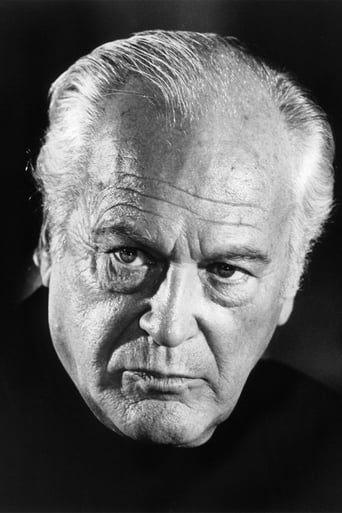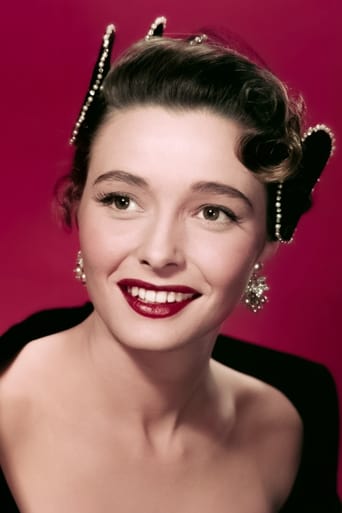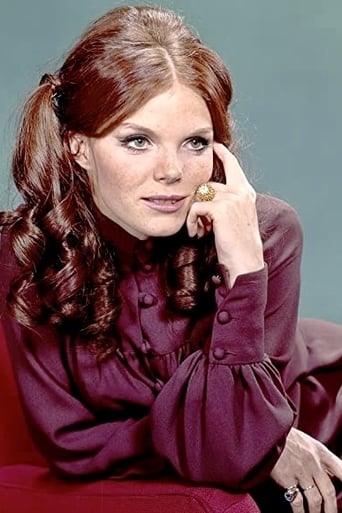Karry
Best movie of this year hands down!
Afouotos
Although it has its amusing moments, in eneral the plot does not convince.
Livestonth
I am only giving this movie a 1 for the great cast, though I can't imagine what any of them were thinking. This movie was horrible
KnotStronger
This is a must-see and one of the best documentaries - and films - of this year.
mark.waltz
Two fabulous actresses are absolutely wasted in this dreadful sex melodrama that was probably too forgettable to end up on critic's worst list. Patricia Neal tries her best to add class into this tasteless combination of sisterly rivalry and smut that I label "A Patch of Blue Movies". Patricia is a blind woman trying to remember what lead her to become blind, unaware that her husband (Curt Bergens) is trying to seduce her much younger sister (Samantha Eggar) who taunts him while Neal blindly sits by, unaware at first. But the blind have great insight, one thing that the film did get right, and if you haven't nodded off by the time Neal figures this out, then you might go into shock that something with thought behind it just happened.This is painful to get through, a combination of its trashiness and abuse to Neal's character. From her husband, sister, harridan mother in law. They are all slime. Films that utilize sex to move the plot forward or develop one are fine, but this one seems to be getting off on its perversion. I admire Neal for taking on bold roles, but this one makes me winder what she saw when she read the script.
Spikeopath
Psyche 59 is directed by Alexander Singer and adapted to screenplay by Julian Zimet from the novel written by Francoise des Ligneris. It stars Patricia Neal, Curd Jurgens, Samantha Eggar, Ian Bannen and Beatrix Lehmann. Music is by Kenneth V. Jones and cinematography by Walter Lassally.Blind Alison Crawford (Neal) lives with her husband Eric (Jurgens) and finds the equilibrium of life upset when her young sister Robin (Eggar) comes to stay. It seems there are secrets to will out, both with Robin and the matter of how Alison came to be blind.A strange, almost hypnotic type of movie, Psyche 59 aims to be a Freudian thriller but just misses the mark of being great. The set up is intriguing, the twists risqué and the photography suitably moody. Neal gives a fine performance as the afflicted Alison, both physically and emotionally, Eggar is super sultry and raises the temperatures considerably, while both Bannen and Jurgens are fine considering the former is under written and the latter gets a character arc that's a bit of a stretch. Unfortunately the pay off is hopelessly weak, the whole build up holds the attention, you sense we are heading for great dramatic denouement, but sadly that's not the case and it leaves a disappointing taste in the mouth. 6/10
Poseidon-3
Made at a time when psychological dramas were enjoying popularity and at a stage when what could be depicted on screen was being tested with each new film, this movie showcases the talents of its star trio fairly well. Neal plays a blind woman, married to Jurgens, who is blind not because of any substantial injury or illness, per se, but because she has suffered some sufficient mental trauma to render her sightless – hysterical blindness. Her husband dotes on her while simultaneously seeming to resent her. Things get even stickier when Neal invites her baby sister Eggar back home to live with them. Eggar dates family friend Bannen, who already has a flirtatious rapport with Neal, while Jurgens struggles with an attraction to Eggar. Eggar, an unbelievably brazen and selfish person, leads him on deliberately, sometimes right under the nose of her sight-impaired sister. When Neal and Eggar head out to the country to visit grandmother March, with the gentlemen soon joining them, things take on a more upsetting tone, culminating in yet another traumatic series of events which call Neal's vision into question again. Neal, fresh off an Oscar win for "Hud," is captivating to watch here and retains most of the film's focus. Jurgens, although top-billed, is somewhat less central though he does an excellent job. His steely eyes are well-served by the stark black and white cinematography (which is wonderful throughout.) Eggar is impossibly young and delectable. She shows off an array of 60s fashions and hairstyles, but also gives a strong performance in a role that could have been played very one-dimensionally. Bannen is likable and solid in his less-than-magnetic character. He has the bad luck to be in love with a vixen. March portrays with some degree of restraint the highly atypical grandmother who seems almost devoid of affection and doesn't hand out praise easily. This type of film will not appeal to all viewers as it is at times heavy-handed and strains to be artsy. However, for those willing to take it in, it's a very interesting and engrossing piece. Certainly, the work of the three leads is very strong. In the second half, the focus gets blurry, the pace begins to drag and the motivations of the characters get a bit cloudy, but there are some great moments of tension and anxiety on display. A heavily dramatic score by Kenneth Jones punctuates the opening credits and the emotional scenes. Fans of the leads really can't afford to miss out on it.
numberone_1
This film came on Turner Classic Movies recently, with the host mentioning that it was the film's debut on that channel, and the first film Patricia Neal made after winning the Oscar for Hud.The story concerns a privileged upper-class blind woman named Alison (Neal), her husband Eric (Jurgens) and her younger sister, Robin (Eggar). At first all seems perfectly OK, given the circumstances, but bits of conversation are dropped here and there, darting looks are thrown here and there, and soon we realize that there is something lurking beneath the veneer of a privileged life. Alison, in the final stages of her second pregnancy, suffered a fall in her home that rendered her blind, though as she states early on, it's not that her corneas don't function, it's that her brain won't permit her to see images (paraphrasing here). Apparently this happened in 1959, hence the "'59" in the title: The story then takes place in 1964, five years after this fact, over a time period that seems to be about a month, or maybe two, when Robin re-arrives back into the lives of Eric and Alison after what appears to be a 5-year absence.The black-and-white cinematography adds much to this film, such that I believe if it were in color, it would not be as effective. The language, dialogue and subject matter covered was ahead of its time, at least by U.S. standards, but stylistically, this matches a number of thrillers and socially-conscious dramas that came out of England in the early- to mid-1960s (e.g., Victim, Pumpkin Eater, etc.).The first part of the film, set in London, sets up the story beautifully, and it isn't long before we start to realize that something's "up" - the carefully-worded dialogue, with certain key words and phrases omitted, or the glances of the blind Alison behind her sunglasses, to the beat of her words...you see that all that glitters is not gold, so to speak.The second part of the film takes place at the characters' country house, located near a coastline; It is here that the set-up for what could be a riveting tale, as depicted in the first part of the film, loses steam and slows to a crawl, such that the conclusion is neither climactic nor satisfying; this is a shame, because it could have been done much better. Besides that, I do agree with the comments made by a previous observer, including that the grandmother doesn't seem quite grandmotherly (and actually, I'm sort of confused as to why this character is even in the picture).Nonetheless, the acting is superb by all the leads, and particularly by Neal, who carries the film, in my opinion. Pay attention to every movement she makes, whether it's with her eyes, her head or her hands; listen intently to every syllable she utters, for it is through her character that we understand the real story of what has happened, or is happening, to these three people.The movie is based on a book by the same name by Francoise des Ligneris, which is available online.




